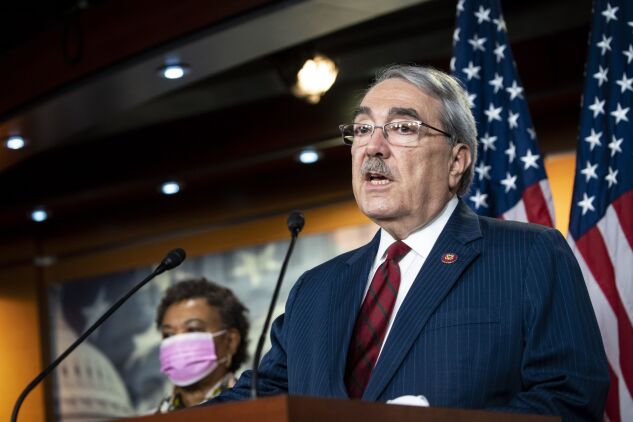Harvard and other Ivy League universities are the public face of President Donald Trump’s war with higher education. But historically Black colleges and universities — which don’t have multibillion-dollar endowments to lean on — may bear the brunt of the budget-slashing if Congress doesn’t buck Trump’s budget.
“Harvard is the shiny object, so you focus on Harvard. What can he do to Harvard? Nothing,” Rep. Jim Clyburn (D-S.C.), an HBCU graduate and a senior member of the Appropriations Committee, said at an exclusive Bloomberg Government roundtable this week.
For Harvard and other Ivy League Universities, the proposed federal funding cuts are a pain point. For Howard and other HBCUs, they’re an existential threat.
Trump has long touted his support for HBCUs and recently said they wouldn’t need to fear his administration’s chainsaw approach to federal spending. Yet, his administration’s proposed fiscal 2026 budget ratcheted down funding for Howard University to fiscal year 2021 levels, arguing for a $64 million reduction because construction of the university’s hospital had been completed.
The proposal has spurred anxiety at the country’s top HBCU, which says its 2026 funding should at least match the current year’s.
Howard, Clyburn said, is far more vulnerable than Harvard. The 158-year-old university’s roughly $1 billion endowment — the largest of any HBCU — is a fraction of the eight Ivy League schools’ funds. The first HBCUs were established in the mid-19th century to educate free Black people, many in the South with Reconstruction-era funding.
Over the past half-decade, both the percentage of federal higher education grants that have gone to HBCUs and the overall amount spent have risen, according to a Bloomberg Government analysis of federal data. The schools now are working to preserve that support amid fears it will plummet.
HBCU’s Limited Lobbying
The nation’s HBCUs, more than 100 in all, spent about $550,000 on federal lobbying in the first quarter of 2025, according to a Bloomberg Government analysis of disclosure filings. That is lower than their wealthier counterparts.
The eight schools in the Ivy League combined spent more than $1.5 million on federal lobbying in the first quarter of the year, disclosures show. University of California, the top spending system, shelled out nearly $1 million so far this year, its biggest tab in a quarter.
Harvard hired Ballard Partners, the firm of Brian Ballard, with ties to the Trump administration. Cornell recently tapped Miller Strategies, a firm with Trump and congressional GOP connections.
Howard University hasn’t disclosed any federal lobbying spending since 2011, congressional filings show. “We look forward to engaging to sustain the FY 2026 budget to at least the level provided in FY 2025, ensuring the continued advancement of our mission and the legacy of academic excellence that defines Howard University,” according to a statement from Howard’s Office of Communications.
Most HBCUs don’t disclose any federal lobbying: only 25 of the more than 100 HBCU institutions reported federal lobbying spending in the first quarter of 2025, even as other universities increased their lobbying to push back on federal funding cuts and fights.
Virginia’s Hampton University tapped a team at McGuireWoods Consulting including former Rep. G.K. Butterfield (D-N.C.), paying the firm $20,000 in the first quarter to lobby on budget, education, and health care matters. Proposals to raise taxes on university endowments and possible changes to federal student aid programs are top of mind, Butterfield said.
“They’re obviously concerned,” he said.
Hampton’s endowment is in the $400 million range, he said, above average for HBCUs but far from top ivies or state universities.
Butterfield, who received his bachelor’s and law degrees from North Carolina Central University, a historically Black institution, said HBCUs aren’t able to absorb lost grant revenue like larger universities.
Federal funding cuts and other policy changes “disproportionately” affect students at HBCUs, said Lynn Pasquerella, president of the American Association of Colleges and Universities, whose members include a cross-section of higher education including HBCUs.
Leslie Jones, a Howard graduate who founded the Hundred Seven to promote HBCUs, said the uncertainty of the second Trump administration is having a devastating impact on smaller universities that rely on research grants.
For smaller universities that rely on tuition to stay afloat, Jones said, cuts to Pell Grants proposed by Republicans would also be felt acutely.
GOP Unclear on Support
The Trump administration has publicly supported HBCUs, including an executive order that promises to buoy HBCUs with proposals like increasing the activity of private-sector foundations. During Trump’s last term, he said he “saved” HBCUs from decline.
“And yet many of the programs that directly benefit HBCUs are being eliminated,” Pasquerella said. “They are right to call the sincerity of these promises into question.”
It’s early in the appropriations season and too soon to say where Congress will land on the cuts.
“We’re going to fight really hard against that,” said Rep. Alma Adams (D-N.C.), who leads the bipartisan HBCU Caucus.
At least one GOP appropriator signaled support for HCBUs. Congress funds HBCUs through discretionary and mandatory appropriations each year.
“I was in the state government before this, and we were able to get, particularly West Virginia State University, a lot of money to them,” said Rep. Riley Moore (R-W.V.), referring to his state’s largest HBCU. “We’re going to continue to support them.”
Rep. Ralph Norman (R-S.C.), a member of the bipartisan HBCU Caucus and the hard-right Freedom Caucus, said “I don’t know” when asked whether HBCUs will see Congress reject the White House’s proposed cuts.
“Everything’s on the table now,” Norman said, referring to budget cuts. “We’ll listen to them. I’ve heard their concerns, and we just have to evaluate.”
Harvard and other Ivy League universities are the public face of President Donald Trump’s war with higher education.
— Bloomberg Government (@BGOV) May 15, 2025
But historically Black colleges and universities — which don’t have multibillion-dollar endowments to lean on — may bear the brunt of the budget-slashing if… pic.twitter.com/d2GeY91Inz
To contact the reporters on this story:
To contact the editors responsible for this story:




